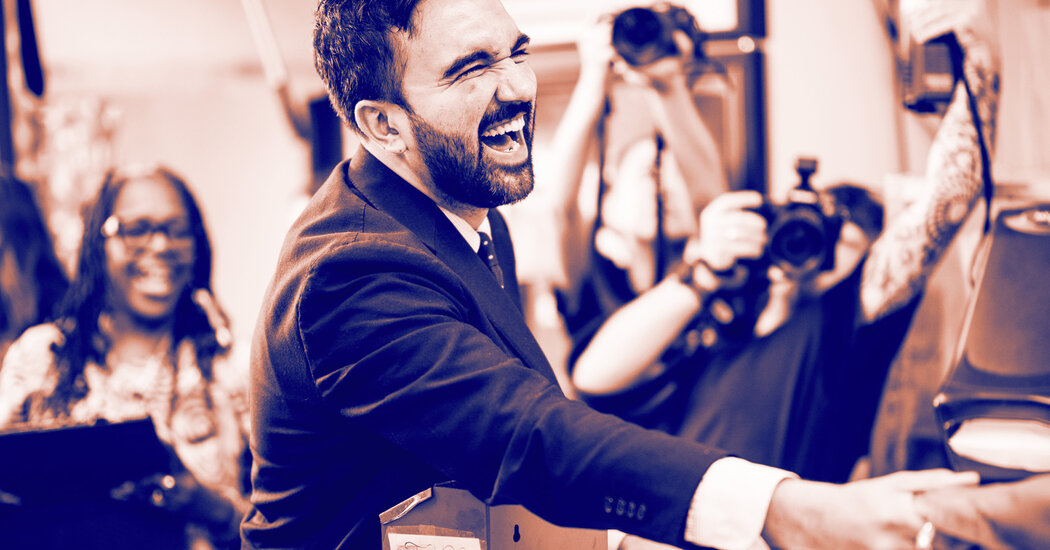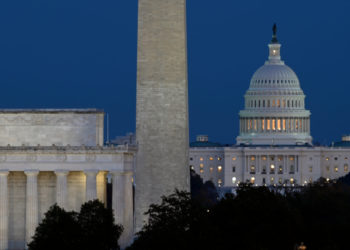Does Zohran Mamdani’s win mean a new dawn for the Democratic Party? Not exactly, Ross Douthat argues. In this mini-episode of “Interesting Times,” Ross explains that the New York mayor’s office has historically been a “springboard to nowhere,” rather than a precursor for national politics.
Below is an edited transcript of an episode of “Interesting Times.” We recommend listening to it in its original form for the full effect. You can do so using the player above or on the NYTimes app, Apple, Spotify, Amazon Music, YouTube, iHeartRadio or wherever you get your podcasts.
It’s official: Zohran Mamdani has been elected mayor of New York City, raising the flag of the far left over Gotham. And if you believe the hype or the fears of his critics, then the 34-year-old Ugandan-born Muslim democratic socialist is poised to remake the Democratic Party, thrilling young voters, mainstreaming socialism and anti-Zionism, and offering himself as the starkest possible contrast to that other New Yorker in the White House.
But I’m skeptical. The odds are that Mamdani’s victory is actually less significant than you think.
In part, that’s because the media, still New York-centric, even in this supposedly decentralized age, tends to hype New York mayoral politics beyond its real significance.
And it’s also because the office of mayor of New York City has tended to be a political springboard to nowhere.
Time and again, we’ve seen famous New York City mayors, from John Lindsay to Rudy Giuliani to Michael Bloomberg, hyped as national political influencers, only to flop outside the five boroughs. When Eric Adams was elected just four years ago, there was a lot of talk about how his distinctive branding as a tough-on-crime African American moderate might make him a leader for the national Democratic Party.
Obviously, that didn’t work out, and all of those figures were at least trying to be centrist or moderates.
Whereas Mamdani has been elected as the left-wing mayor of a left-wing city, and imagining that makes him a model for how the Democratic Party should compete nationwide is a little bit like imagining that a far-right Republican elected in Alabama or Idaho is likely to offer a template for how Republicans should compete in swing states.
That’s likely to be a fantasy.
I’ll say this for Mamdani, though. He’s come on the scene at a moment when the leftward wing of the Democratic Party is looking for a national leader.
Because Bernie Sanders can’t live forever, and it’s not clear that Alexandria Ocasio-Cortez or any other figure is quite ready to fill Sanders’s shoes.
So there might be a future where Mamdani ends up getting elected as a governor or a senator and becomes an important factional leader on the left, if not a leader of the Democratic Party as a whole. And that could happen, I suppose, if he governs absolutely brilliantly, maybe even by imitating Sanders’s own successful turn as the pragmatic sewer socialist mayor of the somewhat smaller city of Burlington, Vt.
I think that’s the best case for his long-term political significance, but I still think that it’s more likely that four years of actually governing New York City will demonstrate yet again why getting elected mayor is so often a career peak rather than an opening into something bigger than the Big Apple.
Thoughts? Email us at [email protected].
This episode of “Interesting Times” was produced by Sophia Alvarez Boyd, Andrea Betanzos, Raina Raskin and Victoria Chamberlin. It was edited by Jordana Hochman. Mixing and engineering by Pat McCusker and Isaac Jones. Cinematography by Nick Midwig. Video editing by Stephanie Shen. Original music by Isaac Jones, Sonia Herrero, Pat McCusker and Aman Sahota. Fact-checking by Kate Sinclair. Audience strategy by Shannon Busta. Video directed by Jonah M. Kessel. The director of Opinion Audio is Annie-Rose Strasser.
The Times is committed to publishing a diversity of letters to the editor. We’d like to hear what you think about this or any of our articles. Here are some tips. And here’s our email: [email protected].
Follow the New York Times Opinion section on Facebook, Instagram, TikTok, Bluesky, WhatsApp and Threads.
Ross Douthat has been an Opinion columnist for The Times since 2009. He is also the host of the Opinion podcast “Interesting Times.” He is the author, most recently, of “Believe: Why Everyone Should Be Religious.” @DouthatNYT • Facebook
The post Mamdani’s Victory Is Less Significant Than You Think appeared first on New York Times.




